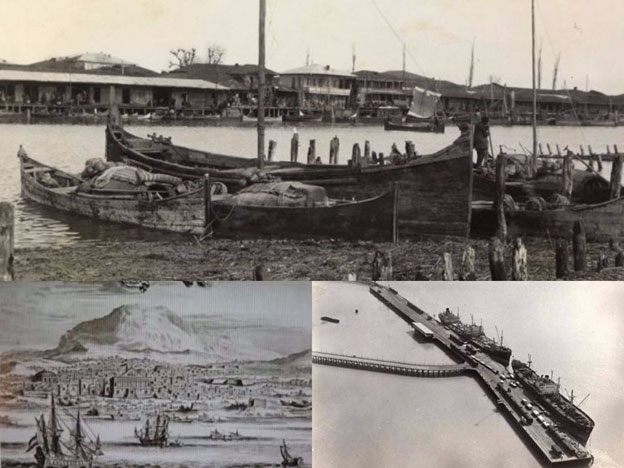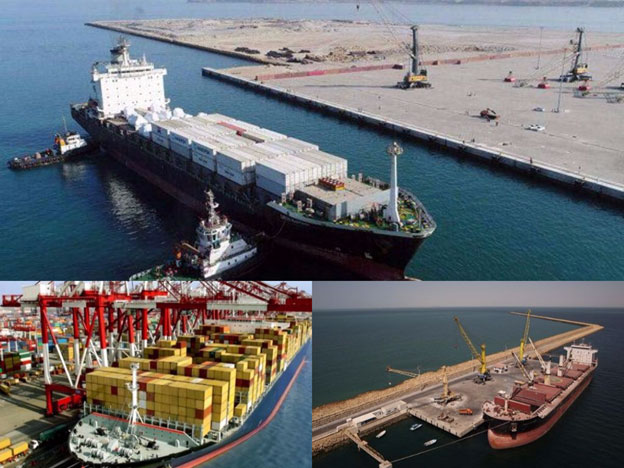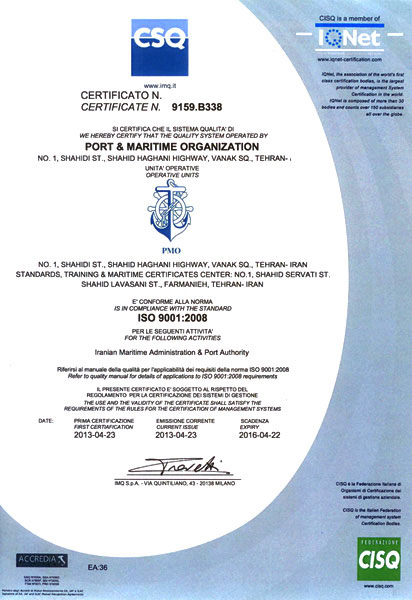History
The implementation of state sovereignty on the coasts and
ports to provide the necessary facilities for expansion of maritime commerce,
coastal communications and collection of the prevalent emolument and tolls are
parts of PMO duties which were set at 25 November 1814 AD.

In 1949, the General Agency of Ports and Shipping was
founded in Roads Ministry instead of General Directorate of Ports.
On 25th May 1960, the General Agency of Ports and Shipping
was changed to Ports and Shipping Organization and its responsibilities and
authorities were increased.
On 31st May 1961, this organization was transferred to the
Department of Commerce, and on 11th March 1963 or after the formation of the
Ministry of Economy, it turned to a subsidiary of this ministry.
On 20th September 1964, the maritime law, which was arranged
in 194 articles, came into force and since 3rd July 1966 the Ports and Shipping
Organization was separated from Ministry of Economy and became subordinate to
the Ministry of Finance with all its budget, employees, and properties based on
the law.
In 1974, this organization was again separated from the
Ministry of Finance and joined the Roads and Transportation Ministry. According
to the decree of the Guardian Council, which was sent to the Islamic
Consultative Assembly by a letter, the name of Ports and Shipping Organization
was changed to Ports and Maritime Organization and all the rules and
regulations which were dominant in Ports and Shipping Organization were exactly
applied in the Ports and Maritime Organization.

Mission
& Function
Organizing the affairs related to Iranian sea ports and commercial shipping
Establishing, complementing and expanding buildings, installations and repair areas designed for sea port activities and commercial shipping as well as providing the related facilities and equipment and operating them
Preparing, adopting and implementing regulations and legislations related to port and maritime activities and commercial shipping, in accordance with the relevant national, regional and international requirements
Regulating the issues related to ship pilotage as per the decisions and approvals of the ports and Maritime Organization High Council
Exerting full supervision over the issues related to the coastal and commercial shipping activities, with an eye on the attempts for their development and guaranteeing safety and security of maritime activities, not to forget taking any other action that would be deemed necessary for the progress and promotion of coastal and commercial shipping;
Organizing and installing navigation lights, signals and other aids at seas and in rivers in order to guarantee safety of shipping in waterways
Registering ships and vessels of commercial, recreational and other functionalities under the flag of the Islamic Republic of Iran, and maintaining them in compliance with the relevant requirements
Issuing certificates of different kinds, such as technical competence, maritime, and so on, for the personnel working on board maritime units in accordance with the relevant requirements
Quality Policies
In order to promote the organization and achieve the demands of the stakeholders, in addition to compliance with IMO laws, regulations and requirements, the Ports and Maritime Organization has applied the quality management system based on ISO9001:2008 standard and the information security management system based on ISO27001:2013 and put them into action with cooperation of all the staff and managers in all the organizational levels.
While announcing the belief and commitment to continuous improvement of the quality management and information security management systems, the headlines of PMO general quality policy are as follows:
Increasing the capacity and throughput exploitable from commercial and passenger ports
Promoting the position and role of Port and Maritime Organization at the international levels
Promotion of the qualitative and quantitative level of port and maritime services to be safe, secure and clean
Providing legal, administrative, and financial grounds for attracting national and foreign investments and cooperation of private sector
Improving total factor productivity (TFP)
Increasing the social responsibility with an emphasis on customer orientation to enhance the level of service quality and accountability
Developing the capabilities of human resources through upgrading educational standards and applying the human resources competency model
Facilitating laws and regulations related to port and marine activities
Availability of information related to PMO business processes, preventing unauthorized access to this information, and ensuring its authenticity and integrity
Continuously monitoring the vulnerabilities and security threats, decreasing the risk level of IT assets and preventing information security events.
